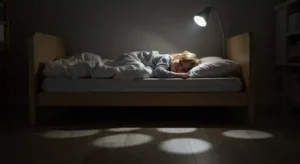Discover the significance of healthy sleep habits for overall well-being, the impact of sleep disorders, effective treatment options, and more in this comprehensive guide.
Sleep is a cornerstone of well-being—impacting your body, brain, and emotional health more than you may realize. Yet, in today’s fast-paced lifestyle, healthy sleep habits are often sacrificed. Whether due to long work hours, stress, or digital distractions, neglecting sleep can seriously affect your physical health, cognitive function, and mood.
In this comprehensive guide, we’ll explore why sleep matters, how disorders like insomnia and sleep apnea disrupt it, and how to build better habits that help you wake up refreshed and perform at your best.
Why Healthy Sleep Habits Matter
🧠 Supports Physical Health
During sleep, your body repairs cells, regulates hormones, and strengthens immune defenses. Chronic sleep deprivation has been linked to:
Increased risk of heart disease and stroke
Obesity and insulin resistance
Suppressed immune function
Hormonal imbalance
Prioritizing regular, quality sleep is one of the simplest ways to improve your overall physical health.
💡 Boosts Mental Clarity and Mood
Sleep plays a critical role in memory consolidation, learning, and emotional stability. When you’re well-rested, you’re better equipped to:
Focus and make decisions
Process complex information
Manage anxiety and irritability
Cope with life’s stressors
Even one night of poor sleep can impair your mood and cognitive performance. Long-term sleep loss can lead to serious mental health conditions.
🚀 Improves Daily Performance
Healthy sleep habits fuel productivity. People who sleep well are more:
Energetic
Creative
Motivated
Resilient in the face of challenges
Better sleep equals better performance at work, school, and in personal relationships.
Common Sleep Disorders and Their Effects
😴 Insomnia
Insomnia is marked by difficulty falling or staying asleep, often caused by stress, anxiety, or poor sleep habits. It can lead to:
Daytime fatigue
Irritability and low motivation
Decreased memory and focus
Treatment includes cognitive-behavioral therapy (CBT-I), relaxation techniques, and routine changes.
🫁 Obstructive Sleep Apnea
Sleep apnea involves repeated interruptions in breathing during sleep, often accompanied by loud snoring or choking sounds. Left untreated, it raises the risk of:
High blood pressure
Heart disease
Diabetes and metabolic issues
Treatments range from CPAP therapy to lifestyle changes or surgery, depending on severity.
🦵 Restless Legs Syndrome (RLS)
RLS is a neurological disorder that causes unpleasant leg sensations and an urge to move them—often worsening at night. This leads to fragmented, poor-quality sleep. Management includes:
Medications
Iron supplements if deficient
Avoiding triggers like caffeine or alcohol
Effective Treatment Options for Sleep Disorders
🧠 Behavioral Therapies
CBT-I is the gold standard for treating insomnia without medication. It helps retrain the brain to associate bedtime with rest. Other behavioral approaches include:
Sleep restriction therapy
Relaxation and breathing techniques
Stimulus control therapy
💊 Medications
For short-term relief, doctors may prescribe sleep aids or medications tailored to specific conditions. However, these are best used:
Under strict medical supervision
Only when behavioral interventions are ineffective
As part of a broader treatment plan
🌬️ Device Therapies
CPAP (Continuous Positive Airway Pressure) machines are commonly used for sleep apnea and provide:
Improved oxygen flow
Fewer sleep interruptions
Better overall heart and brain health
How to Improve Your Sleep Naturally
⏰ Stick to a Regular Schedule
Go to bed and wake up at the same time daily—even on weekends. This helps regulate your circadian rhythm, or internal body clock.
🛀 Create a Relaxing Bedtime Routine
Wind down with calming activities like:
Light stretching or yoga
Reading a book
Listening to calming music
Taking a warm (not hot) bath
Avoid screens, caffeine, or alcohol before bed.
🛏️ Optimize Your Sleep Environment
Make your bedroom a sleep-friendly space:
Keep it cool (60–67°F / 16–19°C)
Use blackout curtains or eye masks
Choose a supportive mattress and pillow
Block out noise with white noise machines if needed
📵 Limit Blue Light Exposure
Blue light from phones, tablets, and TVs delays melatonin production. Try:
Turning off screens 60 minutes before bed
Using night mode or blue-light filters
Reading printed material instead of digital
🏃 Stay Active During the Day
Exercise helps regulate hormones and promotes deep sleep. Just avoid intense workouts within 2 hours of bedtime. Aim for:
30+ minutes of movement per day
Outdoor activity for light exposure
A balance of cardio and strength training
Conclusion
Healthy sleep habits are a powerful foundation for total well-being. By understanding the role of sleep in physical, mental, and emotional health—and recognizing and treating underlying disorders—you can unlock a better, more energized version of yourself.
Make sleep a non-negotiable part of your wellness routine. The benefits ripple into every part of life, from how you think and feel to how you move and perform.
Frequently Asked Questions
What are the most common types of sleep disorders?
The most common sleep disorders include insomnia, sleep apnea, restless legs syndrome (RLS), narcolepsy, and parasomnias.
How can I improve my sleep quality naturally?
Start by sticking to a regular sleep schedule, creating a soothing bedtime routine, limiting screen use before bed, exercising regularly, and creating a dark, quiet, and cool sleep environment.








